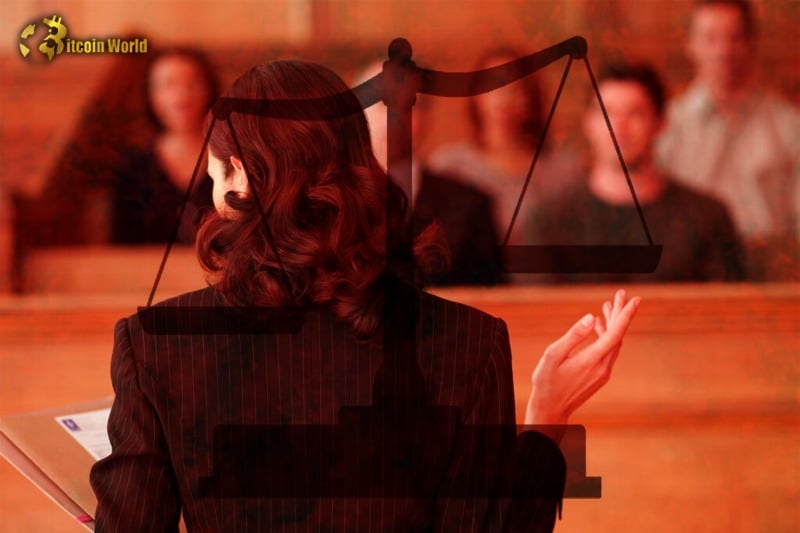The legal drama surrounding Sam Bankman-Fried, the once-celebrated crypto king and former CEO of FTX, is intensifying as we approach his fraud trial. His defense team is now raising serious concerns about the fairness of the jury selection process. Are the questions being proposed designed to ensure an impartial jury, or do they subtly – or not so subtly – point towards a predetermined outcome? Let’s dive into the latest developments in this high-profile case.
Defense Argues Jury Questions are ‘Prejudiced’
In a legal filing dated September 29th, Mark Cohen, the lead attorney representing Sam Bankman-Fried, didn’t mince words. He asserted that the jury selection questions proposed by the US government are not just flawed, but actively biased. According to Cohen, these questions risk tainting the jury pool right from the start, potentially jeopardizing Bankman-Fried’s right to a fair trial.
Cohen’s argument centers on the idea that the government’s questions are framed in a way that already suggests Bankman-Fried’s guilt. He emphasizes that the language used could lead potential jurors to believe that fraud and money laundering are already established facts, rather than allegations that need to be proven beyond a reasonable doubt.
Key Concerns Raised by SBF’s Legal Team:
- Inherent Bias: Cohen argues the questions are designed to elicit biased responses from potential jurors.
- Insufficient Information: He claims the proposed questions won’t adequately reveal potential juror biases, hindering the defense’s ability to select a fair jury.
- Prejudicial Language: The defense highlights the use of phrases like “his fraud” instead of “alleged fraud,” arguing this phrasing assumes guilt.
- Presumption of Innocence: Cohen stresses the critical need for the court to remind jurors that Bankman-Fried is presumed innocent until proven guilty.
“His Fraud” vs. “Alleged Fraud”: A Matter of Semantics or Serious Prejudice?
The crux of the defense’s argument lies in the seemingly small, but potentially impactful, difference between “his fraud” and “alleged fraud.” Cohen points out that by using the former, the government’s proposed questions subtly present fraud as a confirmed fact, rather than an accusation that the prosecution must prove.
Think about it – if you were a potential juror and consistently heard references to “his fraud” during the selection process, wouldn’t it be easy to start forming an opinion even before the trial begins? This is precisely the concern that Bankman-Fried’s legal team is raising. They want to ensure that the jury selection process is truly neutral and doesn’t inadvertently prejudice potential jurors against their client.
Defense Pushes for Their Own Jury Selection Questions
To counter what they perceive as a biased approach, Bankman-Fried’s legal team has proposed their own set of jury selection questions. Cohen is advocating for the court to adopt these alternative questions, believing they would ensure a fairer and more impartial jury selection process.
However, as with many aspects of this case, there’s another side to the story.
US Government Pushes Back: SBF’s Questions are “Unnecessary”
It’s not surprising that the US government doesn’t see eye-to-eye with the defense on this matter. Cointelegraph reported that the prosecution has already opposed Bankman-Fried’s proposed jury questions, deeming them unnecessary and a waste of time.
Specifically, the government reportedly objected to questions related to:
- Pretrial Media Coverage: Inquiries about jurors’ exposure to media reports about the case.
- Effective Altruism: Questions about the philosophical movement associated with Bankman-Fried.
- Political Contributions and Lobbying: Questions regarding jurors’ views on political donations and lobbying activities.
- ADHD: Inquiries related to attention-deficit/hyperactivity disorder.
The government likely believes these topics are either irrelevant to the core issues of the trial or could unnecessarily complicate and prolong the jury selection process. They want to keep the focus narrow and efficient.
Trial Timeline and SBF’s Detention
The clock is ticking. Jury selection is scheduled to kick off on October 3rd, with the trial itself commencing the very next day, October 4th. The trial is expected to be substantial, with 15 full trial days planned for October and an additional six in November, according to the recently released schedule.
Adding to the pressure, Sam Bankman-Fried remains in detention at the Metropolitan Detention Center since August 11th. Despite repeated attempts from his legal team, Judge Lewis Kaplan has consistently denied his requests for temporary release, citing concerns about flight risk and potential witness tampering. This means SBF will be preparing for one of the most significant trials in crypto history from behind bars.
What’s Next?
The immediate focus will be on the jury selection process. The court will need to decide whether to heed the concerns of Bankman-Fried’s defense team regarding potential bias in the questions. The outcome of this decision could have a significant impact on the fairness and perception of the trial itself.
As the trial date approaches, the stakes are incredibly high for Sam Bankman-Fried. The allegations of fraud and money laundering are serious, and the legal battles are only intensifying. Will the jury selection process be deemed fair and impartial? Will Bankman-Fried be able to effectively defend himself under these circumstances? The crypto world and beyond will be watching closely as this case unfolds.
Disclaimer: The information provided is not trading advice, Bitcoinworld.co.in holds no liability for any investments made based on the information provided on this page. We strongly recommend independent research and/or consultation with a qualified professional before making any investment decisions.




